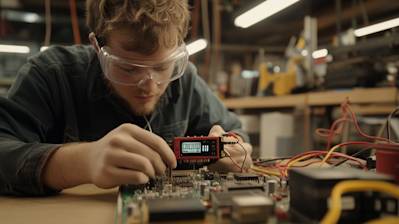If there's one tool that became synonymous with the world of electrical work, it's safe to say it's the electrical tester. Essential to electricians and other professionals who work with electrical systems, these versatile tools offer a convenient and secure solution for conducting a wide range of electrical tests. This versatility has indeed added to its popularity across different electrical realms. In this blog post, we will delve comprehensively into the realm of electrical testers and scrutinize their importance, types, and how they function.
Understanding Electrical Testers
As the name implies, an electrical tester or circuit tester is a device used to test the presence of electrical current in a circuit or any electrical component for that matter. They can vary in design and complexity depending on their particular purpose. There are simple electrical testers with LED lights that illuminate when they come into contact with a live wire and there are more sophisticated ones that are digital and displays detailed readings such as voltage, resistance, and current capacity.
The Importance of Electrical Testers
Electrical testers play a key role in ensuring the safe installation and maintenance of electrical systems. Understanding their importance will offer you a new perspective on their functionality. Let's explore their critical features:
- Safety: Electrical testers are crucial safety tools used to determine if an electrical circuit or individual component is live. This helps in preventing dangerous shocks and equipment damage during testing or servicing.
- Diagnosis: They function in troubleshooting and diagnosing electrical issues. By measuring voltage, resistance, and continuity, they can determine the status of a device/component.
- Verification: Post-installation, it is necessary to ensure that all connections have been made correctly and safely. Electrical testers play a vital role in this verification process.
A Broad Look at Various Types of Electrical Testers
Voltage Testers
Voltage testers are designed to verify the presence of voltage in a circuit. Hence, they are also commonly known as voltage detectors or voltage meters. Some modern voltage testers are equipped with non-contact technology allowing them to measure voltage without direct contact with a wire or outlet.
Continuity Testers
As the name suggests, a continuity tester is used to verify the presence of a complete path for current to flow in an electrical circuit. They often have a pointed probe at one end and a lead wire with an alligator clip on the other, they quickly and reliably determine if a circuit is open or closed.
Multimeters
Multimeters are comprehensive electrical testers that combine the functions of a voltmeter, ammeter, and ohmmeter. They are used to measure voltage, current, and resistance respectively within an electrical circuit.
Optimization and Proactive Use of Electrical testers
Like any other tool, the efficiency of an electrical tester heavily depends on how optimally it is being used. Here are a few tips for optimizing and proactive use of electrical testers:
- Always ensure the equipment is working correctly before using it. Test it on a known live circuit to verify its functionality.
- Always keep the safety tips in mind. Remember, when working with electricity, safety should always be your utmost concern.
- Understand the tester's limitations. Each tester is designed to measure certain specific parameters.
- Proper care and storage is essential. Always store electrical testers in a clean, dry place to increase their lifespan.
Electrical testers have been a crucial part of electrical safety since their inception. With the evolution of technology, these handy tools have developed into comprehensive devices, capable of carrying out a wide range of electrical tests. To maximize the efficiency and lifespan of an electrical tester, it's essential to understand its functionality, use it appropriately and look after its maintenance and storage conditions. With appropriate knowledge and practical skills, electrical testers can truly revolutionize safety measures in the electrical realm.
Frequently Asked Questions about Electrical Testers
How to use an Electrical Tester?
To effectively use an electrical tester, such as a multimeter, follow these guidelines:
- Safety First: Always confirm that the device or circuit you're testing is powered off and disconnected from any electrical source to prevent shocks or damage.
- Understand Your Tester: Familiarize yourself with your electrical tester's features and operation by thoroughly reading the manual that comes with it. This ensures you're aware of its capabilities and limitations.
- Setting Up: Depending on what you're measuring (voltage, current, resistance, etc.), set the tester's dial to the correct function.
- Making Connections: Attach the tester's probes to the specific points of the device or circuit you're evaluating. Ensure a secure and correct connection for accurate measurements.
- Interpreting Results: Carefully read the display to understand the measurements and assess the electrical status of the device or circuit.
By adhering to these steps, you can safely and accurately use an electrical tester to diagnose and analyze electrical systems and components.
What safety measures to take when using Electrical Testers?
Safety is paramount when using electrical testers. Before testing, always ensure the device is off and disconnected from any power source. If testing a circuit, ensure it is de-energized. Wear protective equipment such as insulating gloves and safety glasses where necessary. Never try to repair the tester by yourself in case of faults; seek assistance from an expert.
Are all Electrical Testers reliable?
The reliability of an electrical tester largely depends on the quality, brand, and how it's used. High-quality testers from reputable brands are generally reliable. However, misusing the tester or nurturing poor maintenance practices can impair its reliability.
What are the applications of an Electrical Tester?
Electrical testers find a broad range of applications in various fields. They are used for troubleshooting electrical problems in home appliances, vehicles, and industrial equipment. Electricians use the testers to verify the presence of voltage in circuits, detect faults or shorts in wiring, and ascertain the functionality of fuses, switches, and outlets.
In what units are the readings of Electrical Testers represented?
Electrical testers represent measurements in different units based on the parameters being tested. Voltage is measured in volts (V), current in amperes (A), and resistance in ohms (Ω). Some testers can measure other parameters like capacitance and frequency, which are respectively represented in farads (F) and hertz (Hz).
When to replace an Electrical Tester?
Electrical testers don't have a universal expiry timeline, but some signs should tell you when it's time for a replacement. These include inconsistent readings, physical damage, a dead display, difficulties in calibration, or expired calibration certificate if applicable. Regular testing and inspection will help you identify these problems early.
How to care for and maintain an Electrical Tester?
Proper maintenance of your electrical tester extends its lifespan, ensuring reliable and accurate readings. Keep the tester clean, avoid exposing it to extreme temperatures, and store it in safe, dry places when not in use. Regularly check for signs of wear and tear, and follow the specific care instructions provided in the tester's manual.
Are there digital and analog versions of Electrical Testers?
Yes, electrical testers come in both analog and digital versions. Analog testers use a needle on a scale to indicate measurements, while digital versions display readings on an easy-to-read screen. Although digital testers are more popular due to their ease of use and precision, analog versions still find use in specific settings.
Pros & Cons of Electrical Testers
Pros of Electrical Testers
Enhanced Safety
Electrical testers significantly improve safety when dealing with electrical systems. They allow users to test if a system or device is live without coming into direct contact with potentially dangerous electricity. This reduces the risk of injury or even death from electrical shock.
Efficiency and Convenience
- Electrical testers help in quickly identifying electrical issues, thus optimizing the process of troubleshooting.
- Most electrical testers are designed to be handheld, making them convenient for fieldwork.
Comprehensive Testing Range
Electrical testers can measure several electrical properties such as voltage, current, resistance, capacitance, and temperature. They usually come with different modes and settings that can be adjusted based on specific testing requirements.
Variety of Options
There are numerous types of electrical testers available in the market suiting every need and budget—from basic voltage testers to advanced digital multimeters.
Cons of Electrical Testers
Can Be Complex To Use
Some advanced electrical testers come with numerous features and functions, the understanding and operation of which can be quite complex for someone who is not trained or familiar with them. There can be a steep learning curve attached to their use.
Risk of Misinterpretation
Electrical testers provide readings that must be interpreted accurately for effective troubleshooting or maintenance. Misinterpretation of these results can lead to incorrect diagnoses and ill-advised repairs, leading to further complications.
Potential Damage
Incorrect use of electrical testers can damage the device under test, potentially resulting in additional expense and inconvenience. Careful handling and correct application are prerequisites to avoiding such outcomes.
Summary
Testing for electrical issues is a breeze with the right tools in hand. Electrical Testers get the job done quickly and efficiently, providing precise readings that inform us if our devices are working properly or not. They save us both time and energy, handling the technical aspects while we make the important decisions.
Overall, Electrical Testers are an essential item for anyone dealing with electrical systems. Whether you're a professional electrician or a handy DIY enthusiast, these tools can make your job much easier. They provide invaluable data about voltage, current and resistance, helping to diagnose and solve electrical issues before they become serious problems.
We have explored the fascinating world of Electrical Testers and discovered what sets these tools apart from others. They are precise, efficient, and utterly indispensable for anyone working with electricity. It's clear that these are not just tools, but allies in maintaining safety and functionality within our electrical systems.
About Sagan Electric
Welcome to Sagan Electric, the premier destination for top-grade electrical solutions in Sacramento, CA. For several years, we have been serving both residential and commercial clients with a commitment to top-notch workmanship, service, and customer satisfaction. Our team of thoroughly trained and certified electricians are adept at handling all kinds of electrical issues, whether simple or complex. No job is too big or too small for us. We incorporate cutting-edge technology and industry-leading practices to ensure we deliver dependable and energy-efficient solutions. Choose Sagan Electric, where we light up your world, one bulb at a time.
Tags: Electrical Testing, Tools, DIY,








